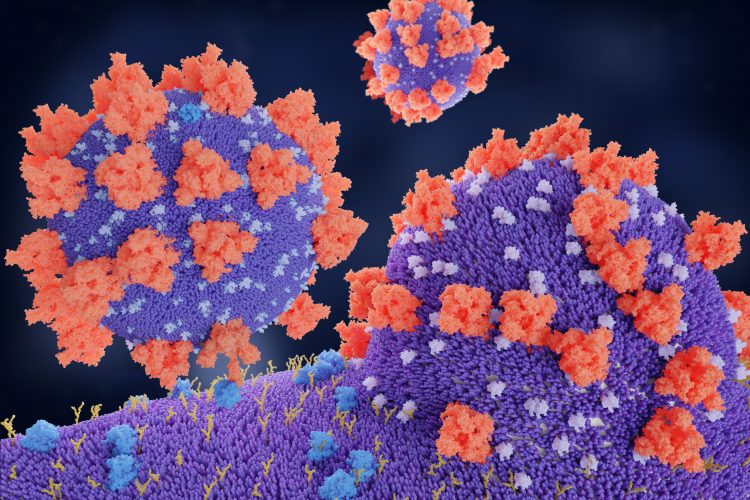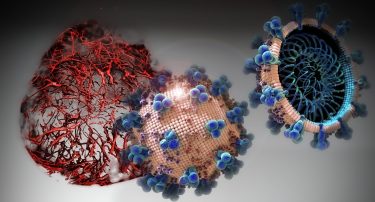Decoy ACE2 receptors could be promising COVID-19 infection-preventing drug
Posted: 3 April 2020 | Hannah Balfour (Drug Target Review) | 11 comments
Recombinant angiotensin converting enzymes (ACE2) reduced infection and viral growth in cell cultures and organoids by acting as a decoy for SARS-CoV-2.


Collaborative research has revealed a drug candidate that could inhibit the SARS-CoV-2 virus causing the COVID-19 pandemic infecting cells through Spike (S) proteins binding to the human angiotensin converting enzyme (ACE2).
Using cell cultures and organoids, researchers from the Karolinska Institutet in Sweden and the University of British Columbia (UBC) in Canada, showed that by adding a genetically modified variant of ACE2, called human recombinant soluble angiotensin-converting enzyme 2 (hrsACE2), COVID-19 was prevented from entering cells.
The paper, published in Cell, shows that hrsACE2 had a dose dependent effect of viral growth of SARS-CoV-2 and was able to reduce it by a factor of 1,000 to 5,000 in cell cultures.
The researchers also used blood vessel and kidney organoids to demonstrate that SARS-CoV-2 can directly infect and multiply within these tissues, a possible cause of the multi-organ failures and cardiovascular damage seen in severe COVID-19 cases. The addition of hrsACE2 also reduced the SARS-CoV-2 infection in these organoids.


In cell cultures analysed in the current study, hrsACE2 inhibited the coronavirus load by a factor of 1,000-5,000 [credit: IMBA/Tibor Kulcsar].
“Our study provides new insights into how SARS-CoV-2 infects the cells of the body, including in blood vessels and kidneys,” said Ali Mirazimi, adjunct professor at the Department of Laboratory Medicine at Karolinska Institutet and one of the study’s corresponding authors. “We believe adding this enzyme copy, hrsACE2, lures the virus to attach itself to the copy instead of the actual cells… It distracts the virus from infecting the cells to the same degree and should lead to a reduction in the growth of the virus in the lungs and other organs.”
While the research has so far been limited to cell cultures and organoids, Aperion Biologics has announced it plans to conduct a clinical pilot study on infected COVID-19 patients in China with its drug APN001, which contains hrsACE2 as an active substance. APN001 was designed and has been tested in Phase II trials for lung disease.
The researchers highlighted that their experiments have only examined the drug’s effect during the initial stages of SARS-CoV-2 infection and that further research is needed to determine if it is also effective during later stages of disease development.
Related topics
Biopharmaceuticals, Biotherapeutics, Cell culture, Drug Development, Drug repurposing, Organoids, Protein, Proteomics, Research & Development, Therapeutics
Related conditions
Coronavirus, Covid-19
Related organisations
Karolinska Institutet, University of British Columbia (UBC)
Related people
Ali Mirazimi




Hi
Now that the outbreak of the corona virus has become global, it has killed many people around the world and endangered the lives of many people.
Your discovery has the highest humanitarian value
As a representative of Iranian entrepreneurs, I thank you, dear scientists
Thank you
Combination therapy with spironolactone and NSAIDs subsides Covid 19 infection and pulmunary complications in 72 hours
I have proposed a chemo-herbal protocol for aggresive prohibition of covid 19. It is a cost benefit preventive and therapeutic protocol. It has been filed in USPTO on march 24. I would like to share the protocol with researchers in all around the world to help overcoming Covid 19.
Hi, I am working on composing an article about SARS-CoV-2 and I would like to include your treatment in the article and maybe collaborate on other areas as well. If you would like this, please contact me via email and we can share more details there.
Hello,
Thank you very much for your comment. Could you please share your protocol with us. It can save thousands of lives with the use of accessible medications!!
The world needs coronas medicine.
That’s good news
How TMPRSS 2 inhibitor can be relevant to target at basic level?
Certainly light at the end of the tunnel
The Spironolactone should be in the list of research.
It is competitive with aldosterone for the receptors.
It does not reduce the levels of renin angiotensin system activity.
Has been demonstrated it can block viral replication in EBV infection.
It is reported patients with hypertension had increased mortality, many of them probably on ACE inhibitors.
Cases cane review and see if spironolactone may been protective in some cases?
Then patients on ACE inhibitors should probably be withdrawn from that therapy during the pandemic time and change to spironolactone combine with other medication like hydralazine or long active nitrates in cases with heart failure?
I am wondering if it is possible to attach an iron or a magnetic element to the ACE lure? The magnetic s can manipulate the position and a blood “filter can be fabricated.